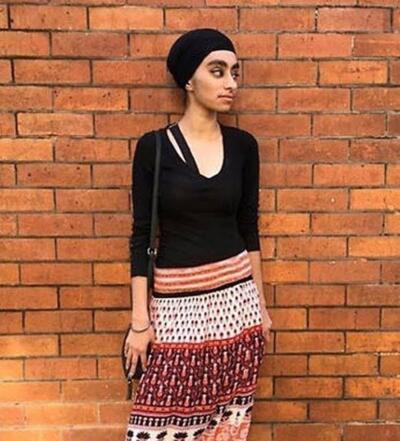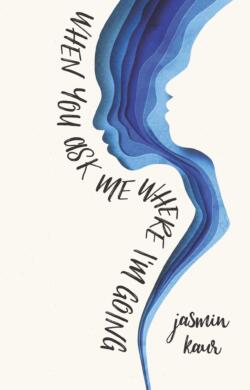1623 The many truths of good fiction
If I Tell You the Truth
by Jasmin Kaur
Toronto: HarperCollins Canada, 2021
$21.99 / 9780062912640
Reviewed by Hanako Masutani
*
 Jasmin Kaur’s If I Tell You the Truth begins with a list of eight trigger warnings. I opened the book, read the list, and considered putting the book back down. Yet while Truth deals with hard-hitting issues such as addiction, rape, and domestic violence, it takes no pleasure in these sources of drama. The traumatic incidents that many Hollywood products revel in depicting go largely undramatized in this book. The focus, instead, is on women’s interior lives and their loving relationships. So let me provide a trigger reassurance: even if you are sensitive and have experienced trauma, you can read If I Tell You the Truth. In fact, you will likely find yourself cared for in Kaur’s book.
Jasmin Kaur’s If I Tell You the Truth begins with a list of eight trigger warnings. I opened the book, read the list, and considered putting the book back down. Yet while Truth deals with hard-hitting issues such as addiction, rape, and domestic violence, it takes no pleasure in these sources of drama. The traumatic incidents that many Hollywood products revel in depicting go largely undramatized in this book. The focus, instead, is on women’s interior lives and their loving relationships. So let me provide a trigger reassurance: even if you are sensitive and have experienced trauma, you can read If I Tell You the Truth. In fact, you will likely find yourself cared for in Kaur’s book.
Jasmin Kaur is a multi-talent — a Surrey, BC, school teacher, writer, spoken-word poet, illustrator, and activist. Her first book When You Ask Me Where I’m Going was a major success, prompting Vogue Magazine to call her “a rising star.” Like her debut book, If I Tell You the Truth is written for teens in both poetry and prose and is published by HarperTeen.

Despite being a work of fiction, If I Tell You the Truth concerns itself with highly specific truths of the predominantly Sikh population in Surrey. Kiran is a young woman from Punjab, sent to Simon Fraser University as an international student in order to better her family’s circumstances. Due to recent changes in Canada’s immigration policies under the Student Direct Stream, the number of international students from Punjab has soared, particularly in cities like Surrey, and Brampton, Ontario. CBC’s 5th Estate recently produced an exploration of the phenomenon, diving into the poverty, racism, exploitation, and despair at the heart of what initially looks like a win-win immigration scenario. If I Tell You the Truth goes on to tell Kiran’s daughter’s story — Sahaara is a Canadian high school student concerned with her mother’s illegal immigrant status, her own Punjabi roots and, like any reasonable teenager, her love life.
If I Tell You the Truth has but one major issue in regards to realism. The book was likely written a few years ago and set in 2020 in order to be more or less current at the time of its publication in 2021. This publishing industry time-lag has led to the unfortunate fact that If I Tell You the Truth takes place in a 2020 no reader would recognize. Kaur acknowledges the pandemic’s absence in her story and provides notes at the back of the book for readers interested in learning how she believes Covid-19 would have affected the characters and the events in their narrative. Kaur is nothing if not accountable.

Although both Kiran and Sahaara are realistic residents of Surrey, their stories are not often told, or if they are told, it is as dismembered news items exemplifying “issues” such as gang crime, international students, and unskilled labour. If I Tell You the Truth works against this tendency by giving its characters a voice. The book switches between Kiran and Sahaara’s first-person perspectives and refuses to see the obstacles its characters face as disconnected issues. When Sahaara pitches her graduation art project to her professor, she receives a warning:
The issue is this: I don’t think you’ll be able to make a powerful visual statement with your painting if you’re spreading your focus across two very heavy topics. You may make a better impact if you focus on one part of [your mother’s] experience (p. 284).
Sahaara feels differently:
How, exactly, do I explain this to my professor? Mom’s trauma doesn’t fit in neat boxes. It didn’t come with a one-sentence label. My mom’s experiences are all connected … I want to emphasize that through this project. That … connectedness (p. 284).
Defying the notion that human existence can be tidily dissected and tagged, Kaur’s book not only employs multiple perspectives and multiple literary forms — both poetry and prose — it also tackles a multitude of issues, from police brutality to immigration law.
As a function of its attention to the difficult elements of life as an Indo-Canadian woman, If I Tell You the Truth is packed with heart-thumping emotion. Peace and joy are at a minimum. This is political and, I am guessing, for a teenager, engaging. For this middle-aged reader, it was also, at times, exhausting.

At times, readability also suffers, taking a back seat to the book’s political messages. But the wisdom of If I Tell You the Truth is worth it. There is wisdom on working with survivors: “To push your own ideas of healing or justice onto a survivor may be to traumatize them again” (p. 433). There is wisdom on relationships: “How’d you know you were supposed to be with your girlfriend?” Saraah asks her Maasi. Maasi Joti replies, “because I never had to justify our relationship. Like, I didn’t have to constantly convince myself that things were good. Or that I was happy …. We just came to each other as ourselves–our realest selves–and we fit” (p. 322). The book rejects rom-com truths we’ve been handed down — truths like a happy ending includes a romantic love interest and that a hero(ine) is someone who saves someone else. If teen readers can absorb even a portion of the wisdom here, they will have a solid head start at adult life.
Kaur’s book ends with another list, a list of acknowledgments. She thanks 23 women, then concludes, “without whom this work wouldn’t have been possible.” If I Tell You the Truth reminds readers that the truth is messy but, through the support and love of one another as family or chosen family, we can accomplish much.
*

Hanako Masutani is a Vancouver parent, teacher, and writer. Her poem “Charlie Horse” was awarded Arc Poetry Magazine’s Confederation Poets Prize in 2018. Her poems, fiction, and essays can be found in Geist, Grain, The New Quarterly, and Riddle Fence, among other publications. Look for her early reader Emi and Mini, to be published by Tradewind Books in June 2023.
*
The British Columbia Review
Publisher and Editor: Richard Mackie
Formerly The Ormsby Review, The British Columbia Review is an on-line book review and journal service for BC writers and readers. The Advisory Board consists of Jean Barman, Wade Davis, Robin Fisher, Barry Gough, Hugh Johnston, Kathy Mezei, Patricia Roy, Maria Tippett, and Graeme Wynn. Provincial Government Patron (since September 2018): Creative BC. Honorary Patron: Yosef Wosk. Scholarly Patron: SFU Graduate Liberal Studies.
“Only connect.” – E.M. Forster
One comment on “1623 The many truths of good fiction”